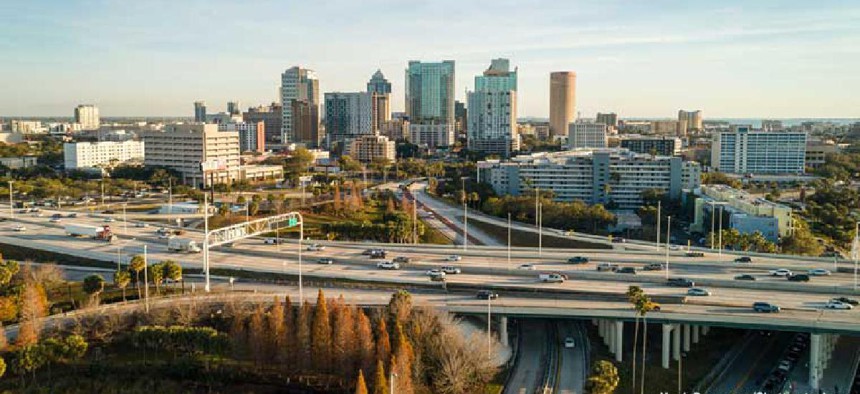Tampa CV pilot seeks volunteers


Connecting state and local government leaders
The Tampa Hillsborough Expressway Authority is looking to recruit 300 volunteers to test connected vehicle applications.
As it moves onto the testing and implementation stages of its connected vehicle (CV) technology pilot, the Tampa Hillsborough Expressway Authority is recruiting volunteer drivers to help improve driver safety in the downtown area.
Since 2015, THEA has been partnering with the U.S. Department of Transportation on pilot projects that leverage vehicle-to-vehicle (V2V) and vehicle-to-infrastructure (V2I) communication technology to improve safety and traffic conditions in downtown Tampa. By the end of the year, THEA will partner with Honda, Acura, Hyundai, Kia and Toyota to equip 300 privately owned vehicles with onboard CV technology that shows drivers safety messages in the vehicle’s rearview mirror.
According to DOT, early research suggests that CV technology can have a dramatic impact on the number of serious traffic-related incidents. Honda Research Institute Chief Engineer Sue Bai said at least 78% of vehicle-to-vehicle related collisions can be addressed via the technology.
The THEA pilot, though, is “not just about technology, it’s about improving people's lives and creating a collision-free society," Bai said in a video explaining the program’s technology.
Partners include DENSO, which will develop a common set of CV apps for the onboard units, enabling the rapid communication between vehicles and surrounding infrastructure. Siemens is developing roadside units that will communicate with connected vehicles and with the city’s Transportation Management Center via dedicated short-range communications, or DSRC. Researchers at the University of South Florida Center for Urban Transportation Research are evaluating the safety benefits of the technology by analyzing the participants’ behavioral responses to the deployment of the CV applications.
Seven new applications will be tested in this phase. These will include traffic-related alerts for imminent forward collisions, necessary ramp deceleration and hard braking ahead. Drivers will also receive warning about hazards in intersections, potential pedestrian collisions and wrong-way entry onto the expressway.
In the past, THEA has tested as many as 13 different CV applications across six different use cases. Ultimately, it plans to test DSRC between the CV-equipped cars, public transit vehicles such as buses and trolleys and roadside units along city streets.
Prospective volunteers must be 18 years or older and drive a vehicle from one of the participating companies. The equipment installed in their vehicles will show safety messages and collect data on drivers’ reactions to warnings. Volunteers will receive discounted toll fares on the Lee Roy Selmon Expressway for their participation in the pilot. Those interested can sign up by completing THEA’s survey.




